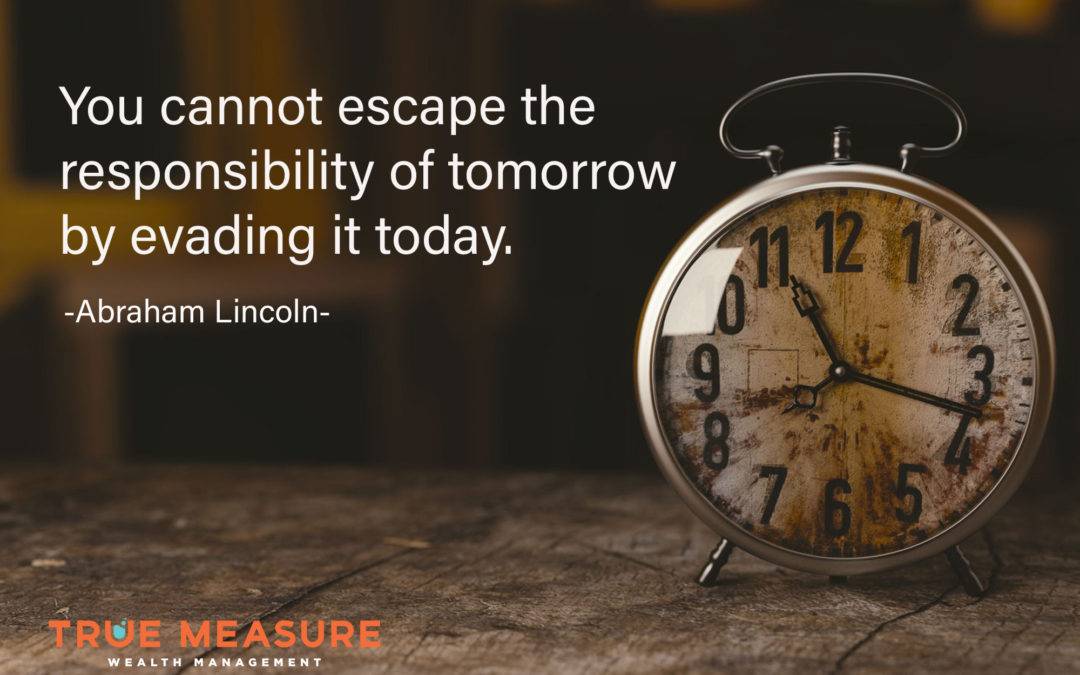Do you find yourself putting off important tasks until it’s too late? Do you miss deadlines, forget events, or find yourself continually in crisis mode because you’ve left everything to the last second? These are all classic signs of procrastination, and it’s an epic problem. Procrastination is often thought of as being lazy or unmotivated. However, what I’ve found in my years as an advice-based independent advisor is that procrastination is usually not about laziness at all. In fact, it most often comes from a much deeper place.
Many people never really dig down deep and figure out why they procrastinate, which means they are pretty much doomed to repeat the behavior over and over. However, once you become more self-aware and figure out your own personality type and how you react to certain stimuli, you may very well uncover the source of your procrastination and finally be able to do something about it. Here are some common reasons I’ve seen my clients procrastinate about one of the most important things in their lives: their retirement planning.
You’re Overwhelmed
I’ve seen a lot of clients who can’t even begin to wrap their minds around everything they need to do to get their portfolios in order. Instead of taking it one step at a time, they freeze and do nothing. Being overwhelmed is a very common cause of procrastination. The best thing you can do in this case is break up the seemingly insurmountable project or task into smaller ones that can be accomplished easily or efficiently. In many cases, simply working with a professional who can show you an easy-to-understand and follow plan can help you break through the wall of procrastination and onto the road to action.
You Don’t Know Who to Turn to for Answers
When it comes to finances, many procrastinators simply don’t know where to turn for answers. If you have not developed a solid relationship with a fiduciary, you may feel you can’t ask your advisor the important questions. This is a sure sign you need to dump your current advisor in favor of one who makes you feel comfortable and valued enough to ask whatever is on your mind. Financial matters are not something that should be taken lightly, and you should never feel like you are alone when it comes to figuring out the hard stuff.
You’re Used to Someone Else Making the Decisions
Many procrastinators simply have not developed the habit of making their own decisions. I’ve seen many cases of this in young people who had authoritarian parents who made all the decisions for them growing up. I’ve also seen it in widows or widowers whose deceased spouse took care of all the money and other practical issues in their lives. Those who don’t know how to make their own decisions usually fall into a pit of worry and indecision that prevents them from taking any action at all. Fortunately, when you work with an advisor who challenges you, you can start recognizing your inability to make decisions and make efforts towards self-empowerment.
You’re Afraid of the Truth
Have you ever just wanted to stick your head in the sand and ignore what’s going on around you because you can’t face it? This is the case with many procrastinators who know, deep down, that they aren’t doing what they need to do to retire successfully. Guess what? Ignoring the problem is not going to solve it and working with an advisor who won’t make you face the truth is not helping the situation either. If you’ve got a fiduciary on your side, he or she will be able to identify when you’re avoiding the truth and guide you on the path to change.
If you procrastinate when it comes to your investing or retirement planning, it’s quite likely there is more to it than a time management issue. If you’d like to talk more about how an advice-based planner can help you with procrastination, please reach out.
 Patrick Tucker, the owner of True Measure Wealth Management, has over 20 years experience in the industry and has spent the last 15 years learning the ins and outs of the fee-only advisory business. He focuses on client behaviors and what ‘wealth’ means for each individual client to provide caregiving plans that lead to a mindful fulfillment of financial goals. A lifelong learner, Patrick uses his continued knowledge to become a valued partner for his clients and help them explore the wisdom of true wealth.
Patrick Tucker, the owner of True Measure Wealth Management, has over 20 years experience in the industry and has spent the last 15 years learning the ins and outs of the fee-only advisory business. He focuses on client behaviors and what ‘wealth’ means for each individual client to provide caregiving plans that lead to a mindful fulfillment of financial goals. A lifelong learner, Patrick uses his continued knowledge to become a valued partner for his clients and help them explore the wisdom of true wealth.

